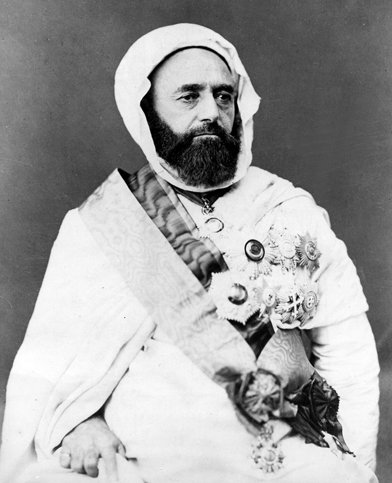
Emir Abdelkader
Abd al-Qadir ibn Muhyi al-Din (6 September 1808 – 26 May 1883; Arabic: عبد القادر ابن محي الدين ʿAbd al-Qādir ibn Muḥy al-Dīn), known as the Emir Abdelkader or Abd al-Qadir al-Hassani al-Jaza'iri, was an Algerian religious and military leader who led a struggle against the French colonial invasion of Algiers in the early 19th century. As an Islamic scholar and Sufi who unexpectedly found himself leading a military campaign, he built up a collection of Algerian tribesmen that for many years successfully held out against one of the most advanced armies in Europe. His consistent regard for what would now be called human rights, especially as regards his Christian opponents, drew widespread admiration, and a crucial intervention to save the Christian community of Damascus from a massacre in 1860 brought honours and awards from around the world. Within Algeria, he was able to unite many Arab and Berber tribes to resist the spread of French colonization.[2] His efforts to unite the country against French invaders led some French authors to describe him as a "modern Jugurtha",[3] and his ability to combine religious and political authority has led to his being acclaimed as the "Saint among the Princes, the Prince among the Saints".[4]
For the song, see Abdel Kader (song). For the Palestinian nationalist, see Abd al-Qadir al-Husayni.
Abd al-Qadir al-Jaza'iri
عـبـد الـقـادر الـجـزائـري
عـبـد الـقـادر الـجـزائـري
Abd al-Qadir ibn Muhyi al-Din al-Hassani
6 September 1808
Guetna, Regency of Algiers
26 May 1883 (aged 74)
Damascus, Ottoman Syria[1]
Legion of Honour (Grand Cross)
Order of Pius IX
First Class of the Order of the Medjidie
Order of the Redeemer (Grand Cross)
From the beginning of his career, Abdelkader inspired admiration not only from within Algeria, but from Europeans as well,[29][30] even while fighting against the French forces. "The generous concern, the tender sympathy" he showed to his prisoners-of-war was "almost without parallel in the annals of war",[31] and he was careful to show respect for the private religion of any captives.
In 1843 Jean-de-Dieu Soult declared that Abd-el-Kader was one of the three great men then living; the two others, Shamil, 3rd Imam of Dagestan and Muhammad Ali of Egypt also being Muslims.[32]
ʿAbd al-Qādir was involved in research that went into the Bulaq Press's 1911 third edition of Ibn Arabi's Meccan Revelations.[33] This edition was based on the Konya Manuscript, Ibn Arabi's revised version of the text, and it subsequently became standard.[33]
The town of Elkader, Iowa in the United States is named after Abdelkader. The town's founders, Timothy Davis, John Thompson and Chester Sage, were impressed by his fight against French colonial power and decided to pick his name as the name for their new settlement in 1846.[34]
In 2013, the American film director Oliver Stone announced the pending production of a filmed biopic called The Emir Abd el-Kader, to be directed by Charles Burnett.[35] To date the film has not been made.
The Abd el-Kader Fellowship is a postdoctoral fellowship of The Institute for Advanced Studies in Culture at the University of Virginia.[36]
On 6 February 2022, a French sculpture of Abdelkader was reported vandalized on 5 February in Amboise, central France. The vandalism occurred amid the presidential election campaign, during which immigration and Islam have been significant issues for specific candidates.[37]




